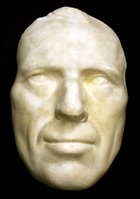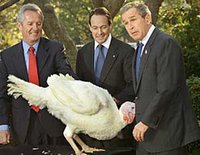 Fosco is a conference whore. Last fall, he presented a paper at the Midwestern Popular Culture Association Conference on a Fat Studies panel. Now, according to the NYTimes, Fat Studies is huge [giggle]. Read about it here. It was an excellent conference, actually. And the Fat Studies people (several of whom are quoted in the Times article) are really interesting and helpful.
Fosco is a conference whore. Last fall, he presented a paper at the Midwestern Popular Culture Association Conference on a Fat Studies panel. Now, according to the NYTimes, Fat Studies is huge [giggle]. Read about it here. It was an excellent conference, actually. And the Fat Studies people (several of whom are quoted in the Times article) are really interesting and helpful.
For your consideration, here is an excerpt from Count Fosco's paper presented last fall. It was entitled "Can Fat Men Be Gay?: The Tension Between Obesity and Homosexuality Within Gay Male Culture":
To the extent that, to modern sensibilities, male sexual desire and fatness are unimaginable together, the animosity of gay men toward fatness becomes more explicable. Being gay in our culture is, almost by definition, a matter of sexual desire. The gay man identifies himself as possessing a certain type of sexual desire—a desire that, to a greater or lesser extent, focuses on other men. Gay pride, the explicit use of the “us” that Savage employs in his discussion of hate crimes, is, in this view, a solidarity based on sexual desire. Savage identifies with this group because he has similar desires. If Gilman is correct in suggesting that the fatness and desire are viewed as incompatible, Savage’s exclusion of fat gay men from his idea of “us” becomes more understandable: if fat men do not have sexual desire, they cannot be included in a group that is defined by sexual desire. In this view, the answer to the question of this paper’s title is clearly “no”: fat men cannot also be gay.Okay, so maybe this wasn't the most academic paper that Fosco has ever written... but it sure was a hoot to present. However, I have no doubt that there will be more opportunities for Fosco to do some good Gay Studies scholarship. Here's to the fat, fat future!
[...]
I am not suggesting that all of gay men’s antifat prejudice is due to the belief that fat gay men do not share the same desires as they do. There are plenty of other negative stereotypes about fat people that gay men, like everyone else in the culture, are exposed to on a daily basis. I don’t want to downplay the other negative stereotypes about fat people, like that we are lazy or lacking in willpower. And I certainly don’t want to discount the powerful anti-fat attractiveness norms that have developed in our society, such that fat people are automatically coded as disgusting. However, I do want to suggest that some of the prejudice that gay men feel toward fat people, as well as some of the anxiety that gay men feel about getting fat, is attributable to the belief that fatness is incompatible with sexual desire. Fatness, then, strikes at the root of a gay man’s self-definition; it is easy to see why fatness becomes threatening. Although the multiply-determined nature of anti-fat prejudice makes it difficult to combat, this analysis suggests that, in order to combat this prejudice among gay men, the realities of fat sexual desire need to be asserted. The belly-dancers-of-size need to be seen at more than just the gay pride parade—we need to see them on television, rub elbows with them in the bars and clubs, and, yes, even read about them in our erotica. Only then will gay men truly begin to build a solidarity based on sexual desire.






